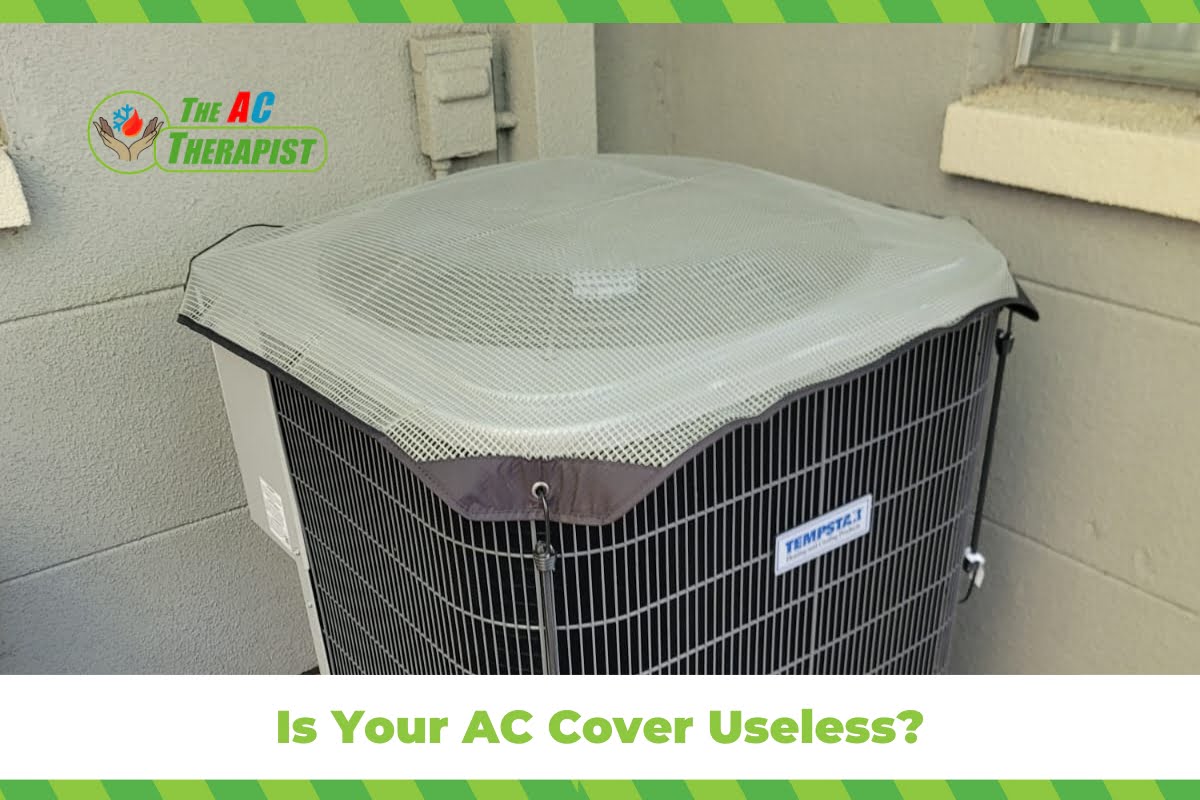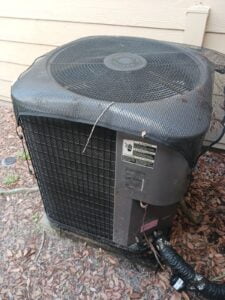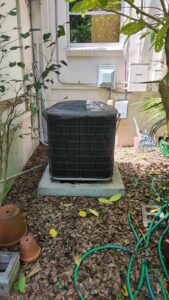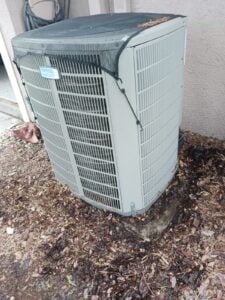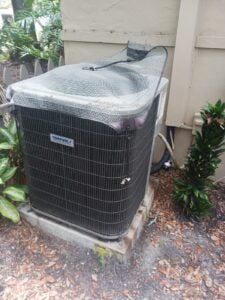Is Your AC Cover Useless?
As a homeowner, you want to ensure your air conditioning (AC) unit stays in optimal condition, providing efficient cooling during the sweltering summer months. One commonly debated aspect of AC maintenance is the use of AC covers. These covers are designed to protect your unit from various elements, such as debris, weather conditions, and animal intrusion. However, opinions on their effectiveness and necessity are divided.
On the one hand, proponents argue that AC covers can extend the lifespan of your unit by preventing damage from external factors. On the other hand, critics claim that these covers can cause more harm than good by trapping moisture and promoting rust and mold growth. This conflicting advice can leave homeowners wondering if AC covers are a helpful tool or an unnecessary hassle.
In this blog, we will delve into the purpose of AC covers, weigh the pros and cons, and provide best practices for their use. Additionally, we will explore alternative methods for protecting and maintaining your AC unit, helping you make an informed decision about whether or not to use an AC cover.
Understanding the Purpose of AC Covers
Protection from Debris
One of the primary reasons homeowners use AC covers is to shield the unit from debris such as leaves, twigs, and dirt. This debris can accumulate inside the unit, potentially clogging the condenser coils and reducing the system’s efficiency. By covering the unit, you can help prevent these materials from entering and causing blockages that can impede airflow and strain the system.
Weather Protection
AC covers are also used to protect the unit from harsh weather conditions. In areas with heavy snowfall, ice storms, or significant rainfall, covers can help prevent water and ice from accumulating on or inside the unit. Over time, moisture can lead to rust and corrosion, which can damage critical components and reduce the unit’s lifespan. A cover can act as a barrier, keeping moisture at bay and helping to preserve the unit’s integrity.
Prevention of Animal Intrusion
Another reason for using AC covers is to prevent small animals, such as rodents, birds, and insects, from nesting inside the unit during the off-season. These pests can cause significant damage to the internal components by chewing through wires, building nests that obstruct airflow, and leaving droppings that can corrode metal parts. By covering the unit, you create a physical barrier that discourages animals from making your AC unit their home.
Extension of Lifespan
By protecting the unit from debris, weather, and pests, AC covers can contribute to extending the overall lifespan of your air conditioning system. Keeping the unit clean and free from potential damage can reduce the need for repairs and maintenance, ultimately saving you money in the long run.
Energy Efficiency
Maintaining a clean and well-protected AC unit can also enhance its energy efficiency. When the condenser coils are free from debris and the unit is in good working condition, it operates more efficiently, consuming less energy to cool your home. This can lead to lower energy bills and a reduced environmental footprint.
Aesthetic Appeal
Lastly, AC covers can improve the aesthetic appeal of your outdoor space. While this may not be the primary reason for using a cover, it is an added benefit. A neatly covered unit can blend more seamlessly with your landscaping and outdoor décor, creating a more visually pleasing environment.
Understanding the purpose of AC covers is essential for making an informed decision about their use. While they offer several benefits, it’s important to weigh these against the potential drawbacks and consider whether an AC cover is right for your specific situation. In the following sections, we’ll explore the arguments against AC covers and provide best practices for their use, helping you protect your AC unit effectively.
The Case Against AC Covers
Moisture Trapping
One of the main arguments against using AC covers is that they can trap moisture inside the unit. Moisture accumulation inside the cover, especially in humid or rainy climates, can lead to several problems:
- Mold and Mildew Growth: Moist environments are conducive to mold and mildew, which can grow on the internal components of the AC unit. This not only poses a health risk but can also damage the unit and reduce its efficiency.
- Corrosion: Prolonged exposure to moisture can cause metal components inside the AC unit to rust and corrode. This can weaken the structure of the unit and lead to costly repairs or even the need for a complete replacement.
Encouraging Rust and Corrosion
Trapped moisture can accelerate the rusting and corrosion of metal parts, including the condenser coils and other internal components. This corrosion can compromise the functionality of the unit, leading to inefficient operation and increased energy consumption. Over time, the damage caused by rust and corrosion can shorten the lifespan of the AC unit.
Overheating Risks
Covering an AC unit during the warmer months can lead to overheating. Air conditioning units are designed to dissipate heat, and covering them can impede this process. If the cover is left on when the unit is operating, it can trap heat and cause the system to overheat, potentially leading to:
- Mechanical Failure: Overheating can cause critical components to fail, resulting in costly repairs and downtime.
- Reduced Efficiency: When the unit cannot release heat effectively, it has to work harder to cool your home, leading to higher energy consumption and increased utility bills.
Attracting Pests
While covers are meant to keep pests out, some types of covers can attract them. Covers that are not tightly sealed can provide a cozy shelter for rodents and insects looking for a warm place to nest. Once inside, these pests can:
- Chew Wires and Components: Rodents, in particular, are known for chewing on wires, which can cause electrical issues and potentially create fire hazards.
- Build Nests: Birds and insects may build nests inside the unit, obstructing airflow and causing the system to work harder.
False Sense of Security
Using an AC cover might give homeowners a false sense of security, leading them to neglect regular maintenance. Relying solely on a cover to protect the unit can result in missed opportunities to address issues that require attention, such as:
- Debris Removal: Even with a cover, debris can accumulate around the unit, which can affect its performance.
- Component Inspection: Regularly inspecting the unit for signs of wear and tear, rust, or pest intrusion is essential for maintaining its efficiency and longevity.
Inconvenience
Removing and reinstalling the cover can be inconvenient, especially if you need to access the unit frequently. This inconvenience might lead some homeowners to avoid covering the unit altogether or to forget to remove the cover before operating the AC, which can cause the issues mentioned above.
Balancing the Pros and Cons
Given the potential drawbacks of using AC covers, it’s important to weigh the benefits against these risks. In many cases, the decision to use a cover will depend on your specific circumstances, including the climate you live in, the location of your AC unit, and your ability to maintain the unit regularly.
In the next section, we’ll discuss best practices for using AC covers to help mitigate these risks and ensure that you’re protecting your unit effectively without causing unintended harm.
When to Use an AC Cover
While there are valid concerns about the potential downsides of using AC covers, there are specific scenarios where an AC cover can be beneficial. Understanding when to use an AC cover can help you protect your unit effectively while avoiding the associated risks.
Seasonal Use
Fall and Winter Protection: Using an AC cover during the fall can help prevent leaves, twigs, and other debris from accumulating inside the unit. This is particularly important if your unit is located near trees or other vegetation that sheds leaves. Covering the unit during the winter can protect it from snow and ice buildup, which can cause rust and corrosion over time.
Harsh Weather Conditions: In regions prone to severe weather conditions such as hailstorms, an AC cover can provide temporary protection to prevent physical damage to the unit’s exterior. However, it’s crucial to remove the cover once the storm has passed to prevent moisture buildup.
Temporary Protection
Yard Work and Construction: If you are performing yard work, landscaping, or construction near your AC unit, a cover can provide temporary protection from dust, dirt, and debris. This short-term use helps prevent particles from entering the unit and affecting its performance. Once the work is complete, remove the cover to allow proper airflow.
Painting or Staining Projects: When undertaking painting or staining projects near your AC unit, using a cover can protect it from overspray or spills. Similar to yard work, this should only be a temporary measure, and the cover should be removed once the project is finished.
Off-Season Storage
Window and Portable AC Units: For window or portable AC units that are not used year-round, covering them during the off-season can protect them from dust, dirt, and pests. Store these units in a dry, sheltered area, cover them to prolong their lifespan, and keep them in good working condition.
Extreme Environmental Conditions
Coastal Areas: If you live near the coast, salt air can be highly corrosive to metal components. Using an AC cover during periods when the unit is not in use can help protect it from salt air exposure. However, it’s essential to choose a breathable cover to prevent moisture buildup.
High Pollution Areas: In areas with high levels of air pollution, an AC cover can help shield the unit from harmful pollutants that can settle on the coils and other components. This can help maintain the unit’s efficiency and prolong its life.
Extended Periods of Inactivity
Vacations or Extended Absences: If you are going to be away from home for an extended period, covering your AC unit can help protect it from potential damage. This is especially useful during times of the year when the unit is not in use, such as during a winter vacation. Ensure that the cover is properly secured and remove it upon your return.
Custom Recommendations
Manufacturer’s Advice: Some AC manufacturers provide specific recommendations regarding the use of covers. It’s always a good idea to consult your unit’s user manual or contact the manufacturer for guidance. Following the manufacturer’s advice can help ensure that you are using the cover correctly and not voiding any warranties.
Balancing Use and Maintenance
While there are specific situations where using an AC cover can be beneficial, it’s important to balance this with regular maintenance and inspection. Even if you use a cover, make it a habit to:
- Inspect the Unit Regularly: Check for signs of rust, corrosion, and pest intrusion.
- Clean the Unit: Remove any debris that may have accumulated around the unit.
- Remove the Cover Before Use: Always remove the cover before operating the AC unit to prevent overheating and ensure proper airflow.
Alternatives to AC Covers
While AC covers can offer certain protective benefits, their potential downsides make it important to consider alternative methods for maintaining and safeguarding your AC unit. Here are some effective alternatives to using AC covers that can help keep your unit in optimal condition.
Regular Cleaning and Maintenance
Routine Cleaning: Regularly cleaning your AC unit is one of the most effective ways to ensure its longevity and efficiency. This includes:
- Clearing Debris: Regularly remove leaves, twigs, dirt, and other debris from around and inside the unit.
- Cleaning Coils: Clean the condenser coils to remove dust and dirt that can impede airflow and reduce efficiency.
- Checking the Fins: Ensure the fins are not bent or damaged. Use a fin comb to straighten any bent fins.
Scheduled Maintenance: Schedule professional maintenance at least once a year. A qualified technician can perform a thorough inspection, clean the internal components, and address any potential issues before they become major problems.
Installing a Protective Fence or Screen
Protective Barrier: Installing a protective fence or screen around your AC unit can help shield it from debris and pests without the drawbacks of an AC cover. Ensure that the fence or screen is:
- Adequately Spaced: Maintain at least 2-3 feet of clearance around the unit to ensure proper airflow.
- Sturdy and Durable: Use materials that can withstand weather conditions and provide lasting protection.
Aesthetic Integration: A protective barrier can also improve the appearance of your outdoor space. Choose a design that complements your landscaping and home exterior.
Elevating the Unit
Raised Platform: Elevating your AC unit on a raised platform can protect it from debris, flooding, and snow accumulation. This is particularly beneficial in areas prone to heavy rainfall or snowfall. When elevating the unit, consider:
- Height: Ensure the platform is high enough to keep the unit above potential flood levels or snow accumulation.
- Stability: Use a stable and level platform to prevent vibrations and ensure the unit operates efficiently.
Using a Breathable Mesh Cover
Breathable Material: If you prefer to use a cover, opt for a breathable mesh cover that allows air to circulate while keeping out large debris and pests. These covers can reduce the risk of moisture buildup and associated problems.
Proper Fit and Secure Installation: Ensure the cover fits snugly and is secured to prevent it from being blown away by strong winds. Look for covers with adjustable straps or drawstrings for a better fit.
Landscaping Considerations
Strategic Planting: Planting shrubs or trees around your AC unit can provide natural protection from debris and harsh weather conditions. However, it’s essential to:
- Maintain Clearance: Keep plants at least 2-3 feet away from the unit to ensure proper airflow.
- Choose the Right Plants: Opt for plants that do not shed a lot of leaves or other debris that could clog the unit.
Mulching and Ground Cover: Using mulch or ground cover around the base of the AC unit can help reduce the amount of dirt and debris that gets blown into the unit. This can also improve the aesthetic appeal of the area around the unit.
Installing a Roof or Canopy
Permanent Shelter: Building a roof or canopy over your AC unit can provide long-term protection from weather elements without trapping moisture. This shelter should be designed to:
- Allow Airflow: Ensure there is ample space for air to circulate the unit.
- Provide Shade: Offer shade to reduce the unit’s exposure to direct sunlight, potentially improving its efficiency.
Materials and Construction: Use durable materials that can withstand local weather conditions. The structure should be sturdy and anchored securely to prevent damage during storms or high winds.
Regular Inspections
Frequent Checks: Performing regular inspections of your AC unit can help you catch potential issues early. Look for signs of wear and tear, rust, corrosion, and pest intrusion. Addressing these issues promptly can prevent more significant problems down the line.
Using a Winterized Enclosure
Seasonal Enclosure: For areas with harsh winters, consider using a winterized enclosure designed specifically for AC units. These enclosures protect from snow and ice while allowing moisture to escape, reducing the risk of rust and mold growth.
Installation and Removal: Ensure the enclosure is easy to install and remove. Follow the manufacturer’s instructions for proper installation to maximize its protective benefits.
Are AC Covers Really Worth It? Expert Insights from The AC Therapist
In conclusion, whether or not to use an AC cover depends on various factors, including your local climate, the location of your unit, and your maintenance habits. While AC covers can offer protection from debris and harsh weather, they also pose risks such as moisture trapping and overheating.
As The AC Therapist, I recommend weighing the pros and cons carefully and considering alternatives like regular cleaning, installing protective barriers, or using breathable mesh covers. By understanding the purpose of AC covers and following best practices, you can ensure your unit remains efficient and reliable for years to come.
Remember, the best way to protect your AC unit is through consistent maintenance and care. If you have any questions or need professional advice, don’t hesitate to reach out to us at The AC Therapist. We’re here to help you keep your home comfortable and your HVAC system running smoothly.

